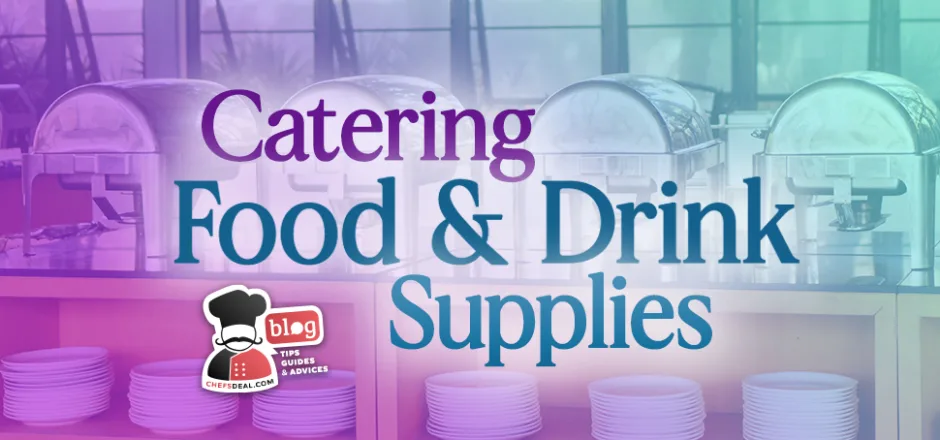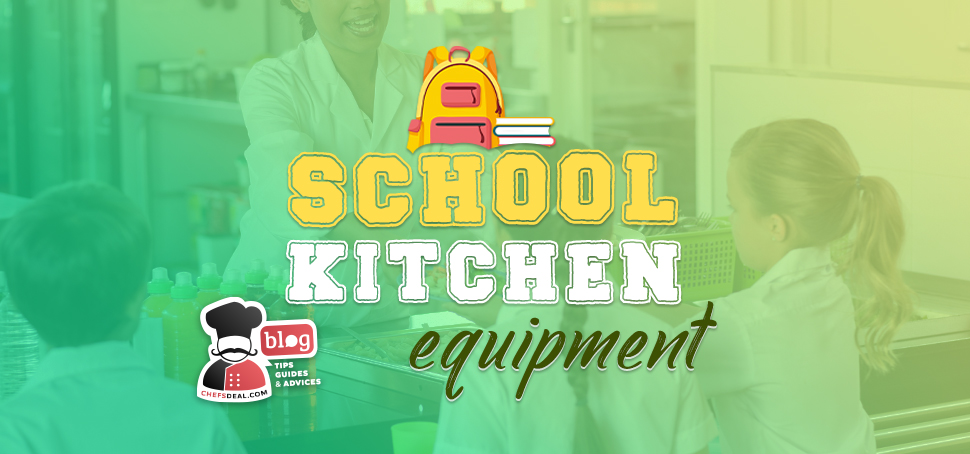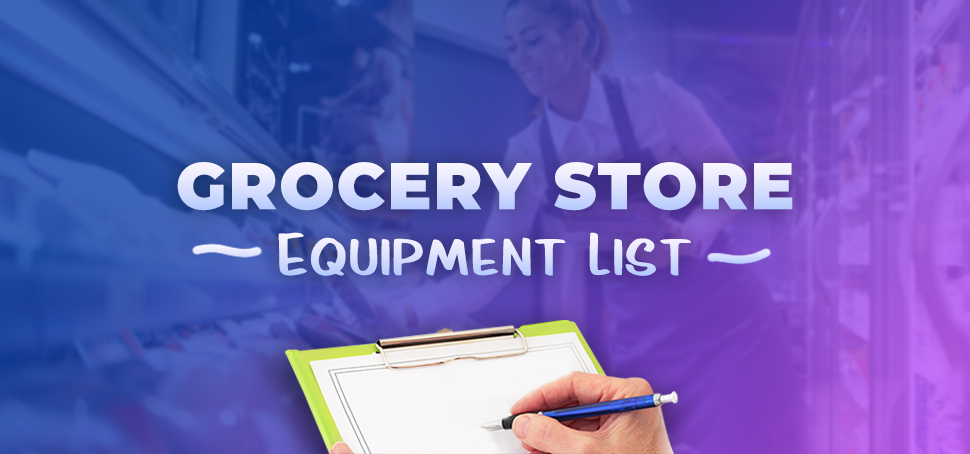Catering food and drink supplies play a pivotal role in the success of any catering venture. From weddings and corporate events to private parties, the quality and variety of supplies you offer can make or break an event.
A catering business prepares bulk food and food services for clients at remote places such as restaurants, hotels, offices, and any kind of special event, from weddings to birthday parties. Various factors make a catering business thrive, and the food quality is what clients expect in the first place. Whether you’re a seasoned caterer or just stepping into the industry, understanding the nuances of food and drink supplies is essential for delivering a memorable culinary experience. Here is a comprehensive guide to entering the catering business and succeeding in catering food and drink supplies.
Understanding Catering Food Supplies
In this realm of catering, mastering food supplies is akin to mastering the palette of a painter – each element contributes to the masterpiece. The success of your catering venture rests upon the quality, mindfulness, and expertise you infuse into every supply and every dish.
What are Catering Food Supplies and Their Importance?
Catering food supplies encompass the heart of any catering venture. Whether prepared by in-house chefs or sourced externally, these supplies ensure the success of events. Catering companies often craft their offerings on-site or partner with third-party vendors for off-site service. This versatility caters to diverse occasions, from weddings to corporate gatherings. The significance lies in delivering impeccable quality, taste, and presentation, making events memorable. By aligning with the event’s theme and meeting dietary preferences, catering food supplies play a pivotal role in elevating guest experiences. This underlines their importance in ensuring the success and satisfaction of every event.
What are The Factors to Consider When Selecting Food Supplies?
- Focus on Freshness and Quality: Food quality and freshness is the first and the most factor in catering food and drink supplies that the clients expect and advance your business. Like all food service businesses, the catering business is a competitive field, so you can’t neglect the customer expectations and quality of the food to thrive.
- Consider Dietary Restrictions and Preferences: Preparing food for a group of people has many essential points to consider. Food allergies and intolerances are one of them that could be dangerous for the customers’ health when disregarded while preparing the food. Whether the client avoids particular meals for health, cultural, personal, or religious reasons, it is essential to meet their requirements carefully while providing the same attention to the deliciousness of the food.
- Seasonality and Local Sourcing: The available goods of the season and the local sources for the supplies are the biggest factors determining the dishes and menus with the available food items. Creating menus depending on the season’s veggies and fruits and accessibility to them is what provides easy serving and timely meals.
Popular Catering Food Supplies
- Fresh Produce and Ingredients: Fresh produce is needed the most for catering food and drink supplies. Fresh veggies and fruits are indispensable for catering services, no matter the event or the place. From numerous dishes to sandwiches and salads, crisp produce will provide fresh and quality meals for the clients.
- Meats, Poultry, and Seafood: Burgers, fried chicken, tacos, and pizza are some of the most popular dishes in the catering industry. Chicken and pork are the most used food items on the catering menus, with a variety of side dishes and salads.
- Dairy and Cheese Products: Cheese boards and charcuterie boards are appetizing catering food supply options for buffets. They can be served at parties, brunches, and breakfasts.
- Baked Goods and Desserts: Desserts are as important as the dishes in an event. Some easy-to-serve and most preferred desserts for catering are cookies, pastries, fruits covered in chocolate, brownies, and cupcakes.
Ensuring Food Safety And Proper Storage
When starting a catering business, the right food storage is what provides catering food and drink supplies safety and prevents food waste.
Temperature Control and Refrigeration: Keeping food at safe temperatures is one of the biggest requirements of commercial kitchens. Proper refrigeration is required for perishable products to be held at safe temperatures and avoid health risks. Ensuring you have enough capacity and proper storage and refrigeration systems for the food you are required to cater should be considered.
Safe Handling and Hygiene Practices: Hygiene is an everyday practice in every phase of life, but it has a significant place in food service operations and kitchens, so in catering food and drink supplies. In catering, food and drink supplies are prepared in bulk, increasing the risk of contamination for multiple people.
The hygiene and cleanliness of the kitchen surfaces, the chef and employees, and the food should be maintained thoroughly and properly. Avoiding cross-contamination by keeping all the surfaces and equipment clean, washing hands regularly, washing produces before cooking, and using a thermometer to ensure the food is cooked thoroughly are some of the hygiene and safe handling practices you can follow.
Compliance With Food Regulations: There are several permits required for catering food and drink supplies, and you need to comply with certain food regulations by ensuring the safety and hygiene practices in your business. Here you can find 6 common catering permits.
- Food Handler Permit
- Caterer Permit
- General Business License
- Health Permit
- Catering Business Insurance
- Liquor Licenses
Navigating Catering Drink Supplies
Beverages are more than just refreshments – they’re a harmonious symphony of taste, presentation, and satisfaction. From selection to presentation, mastering the crafting of the perfect drink offerings will boost your business.
Importance Of Beverage Selection In Catering
Beverages are an important part of catering, enhancing guests’ experience during events. From alcoholic drinks or cocktails to coffees and juices, the diversity of the beverages is enough to meet the guests’ expectations, and there is an option that everyone can enjoy, including the ones with dietary restrictions.
Types Of Beverages To Consider
Depending on the budget and the guests’ preferences, a bar with a variety of alcoholic drinks can be the guests’ favorite part of the event. Apart from alcoholic drinks, tea, coffee, and non-alcoholic refreshments and juices are other beverages that can be catered at events.
- Alcoholic Drinks and Mixers: If you serve alcohol in an event, providing a diverse selection of wines, beers, and cocktails will satisfy the different tastes of all guests. The drink types will depend on whether the beverage service will be self-service or bartending.
- Non-Alcoholic Drinks and Refreshments: Serving non-alcoholic drinks is as essential as alcoholic beverages for the guests not consuming alcohol. Some of the alternatives include various juices, carbonated beverages, various types of tea, and frozen drinks. Serving non-alcoholic cocktails is also a good option.
What are The Factors To Consider When Choosing Drink Supplies?
- Event Theme and Audience Preferences: The theme of the event and the guests’ preferences greatly affect catering food and drink supplies, as the beverage choices. For example, serving juices, tea, and coffee as both hot and cold drink options is a good idea for morning events. But having a full bar with a high diversity of drinks will be exceptional for parties or special dinners. Considering dietary restrictions and allergies is essential while serving beverages too.
- Volume Calculations and Quantities: Knowing the quantity of the drink required is critical to ensure you have enough beverages to serve every guest throughout the event. After learning the number of guests, you can simply calculate the amount of drinks needed. Most guests will typically have two drinks in the first hour and one every hour thereafter. As an average calculation, you can multiply the number of visitors by three to get the number of drinks needed for a two-hour event.
- Availability Of Equipment for Serving Drinks: While catering food and drink supplies for an event, you need to ensure you have the proper beverage equipment and serving appliances for drinks during the event. Ice is indispensable for a bar and drink corner in an event, so ensure you have enough ice throughout the event with ice makers. Coffee machines, tea machines, and cold drink dispensers for juices are the essentials of beverage serving equipment.
Ensuring Drink Quality And Presentation
The quality of the drink is a key point determining the quality of the event. In catering food and drink supplies, presentation is as essential as the food and beverages. For example, offering a unique cocktail by simply adding a special extra ingredient to a standard cocktail and creating a new name, maybe about your company or the event, will make it way more memorable.
- Proper Storage and Handling of Beverages: Ensuring you have proper storage for the beverages to provide easy serving, cooling, and displaying. You can use wine racks for easy reach of the bottles, bottle coolers, and wine chillers for storage and providing an attractive display, glass racks and shakers, and cocktail tools if you have a bar area.
- Garnishing, Glassware, and Presentation Tips: You can enhance the experience of the guests with an appealing presentation of beverages. Using a range of glassware, coffee cups, cocktail glasses, tiki ceramics, and other drinkware, along with assorted straws, cocktail decorations, and sticks that can be used to express the event’s theme, will take the service one step ahead. Depending on the event and clients’ requirements, you will also need disposables, paper, and plastic cups.
- Sourcing From Reputable Suppliers: This part is the bedrock of catering success. Collaborating with established vendors guarantees the quality and authenticity of your catering food and drink supplies. Look for suppliers with a track record of consistency, adherence to safety standards, and a wide range of offerings.
Essential Catering Supplies and Equipment
The biggest part to start catering food and drink supplies is building up an efficient commercial kitchen. To prepare all the food and beverages for various events, you need several commercial kitchen pieces of equipment, from cooking items to refrigeration and tableware.
Tableware and Serveware
The kind of tableware and serve ware will be determined by the event’s theme. For example, a fancy wedding or celebration requires more tableware, such as charger plates, cloth napkins, and stemware, while a casual picnic requires more simple dinner plates, flatware, and water glasses. Using table numbers for large events will make the process easier for the service staff.
- Plates, Cutlery, and Glassware: From pasta plates to dessert plates, cocktail glasses to goblets, a variety of shapes and materials are available for plates and glassware. You can choose the necessary tableware depending on the menu; if there is pasta or pizza on the menu, you will need specialty plates, and the type of glassware will be determined depending on the drinks.
- Serving Trays, Platters, and Bowls: Serving bowls for salads, pizza trays, and platters for sides and main courses, serving tongs, plate covers, and modern-looking wooden serving ware could be some of the serving materials you will need in catering food and drink supplies.
Buffet and Display Equipment
Creating an appealing buffet by keeping the food and drinks at safe serving temperatures while also displaying is easy with the proper buffet and display equipment.
- Chafing Dishes and Food Warmers: They are great for buffets to keep the food warm and ready to serve. Chafing dishes feature chafing fuel to keep the food at serving temperatures and are available in different sizes and materials. Holding cabinets work great for all food types, either with dry heat or humidity; they can keep the food warm and ready to serve for a long time.
- Beverage Dispensers and Ice Buckets: Beverage dispensers are the most practical way of serving cold drinks. There are refrigerated models to keep the beverages cool, and they are ideal for a wide range of drinks, from juices to lemonades. Models with clear bowls make it easy to identify the drink inside. Ice buckets are another essential buffet equipment, ensuring the guests have ice in hand whenever they need it for any drink.
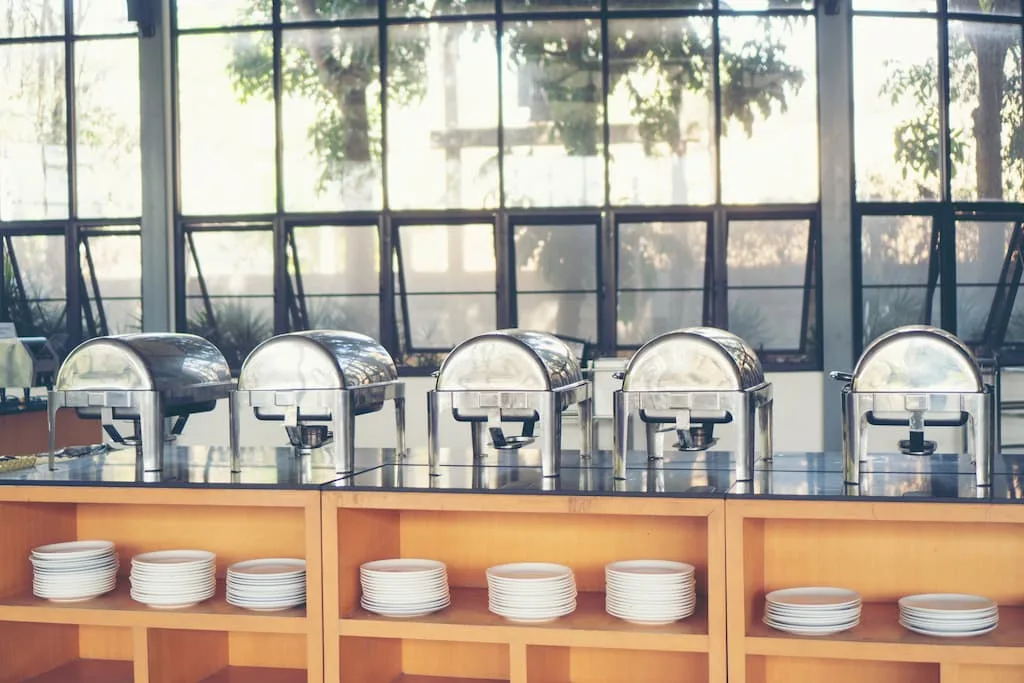
Food Preparation and Cooking Equipment
Whether you cook in your own kitchen or at the event place, there are some main cooking and preparing equipment you will be using.
- Commercial Ovens And Stoves: They are the chief parts of the kitchens. Depending on your available space, usage volume, and budget, you can opt for a combi, conveyor, deck, or convection oven. As a commercial stove, you can get a gas or electric stove depending on your available power source, or opt for an induction range for buffets or little kitchens.
- Food Processors and Mixers: As preparation equipment, you can make batters and dough for a variety of dishes and baked goods using a commercial mixer. A food processor can perform various tasks, from chopping veggies to pureeing and shredding everything in a single piece of equipment, providing efficiency in the kitchen.
Refrigeration and Storage Equipment
Refrigeration is a must in any kitchen to keep the food items at safe temperatures and avoid food spoils. The right and enough storage of the food items ensures food safety, quality, and ease of operation.
- Refrigerators and Freezers: When choosing commercial refrigerators and freezers for your kitchen, the volume of your operation, your budget, and your available place in the kitchen will be determinative. You can choose from reach-in, walk-in, pass-thru, worktop, and undercounter refrigerators and freezers for storing your catering food and drink supplies.
- Shelving and Storage Solutions: Storage is a key point in providing a smooth workflow and an organized kitchen while catering food and drink supplies, which will be provided by storage equipment and shelving. Considering the kitchen layout and choosing proper and enough shelving, using ingredient bins, glass racks, dunnage racks, and tray carts are some of the storage ideas you can use for your catering business.
For further and detailed information about all the catering types of equipment for your operation, you can check out our catering supplies in business types.
Collaborating with Reliable Suppliers for Catering Food and Drink Supplies
Collaborating with reliable suppliers is the cornerstone of a successful catering venture.
What Importance Of Establishing Partnerships With Suppliers
Establishing strong partnerships with food and drink suppliers increase the supply chain efficiency and optimize procedures, decreases waste, and assures timely delivery of the items, which may lower expenses, boost profits and enhance customer satisfaction.
Reliable suppliers are the backbone of success. Partnering with them is more than just a business transaction – it’s a vital collaboration. From sourcing quality ingredients to negotiating contracts, let’s explore the art of collaborating with trustworthy suppliers for a thriving catering venture.
In the end, it ensures consistent access to high-quality food and drink supplies.
Researching And Vetting Catering Food And Drink Suppliers
Researching the other catering food and drink suppliers give you many ideas about the operation and helps in finding reliable suppliers for your business.
Building Relationships And Negotiating Contracts
Building relationships and negotiating contracts based on transparency and shared goals foster a smooth, sustainable collaboration. Supply chain companies mostly have special warehousing, logistics, and distribution knowledge which is great to profit from by building relationships with these companies and gaining experience. Regular monitoring and evaluation of supplier performance maintain excellence throughout your catering business, help to improve operations, and boost market competitiveness.
The 4 General Types Of Catering
Corporate Catering: It is catering for corporate occasions. The event can be a fancy business dinner or a modest workplace party, in which the size and level of the gathering will determine the costs.
Wedding Catering: This type of catering is detailed and requires attention. The theme, decorations, and menu should be particularly discussed with the host to provide the best service.
Social Event Catering: Social events include a wide range of celebrations or gatherings, from bridal showers to birthday parties. Decorations, bartenders, and appetizers can be required in social event catering.
Full-service Catering: This type of catering handles every aspect of an event, from catering food and drink supplies to venue setup, decorating, and cleaning up the event place afterward.
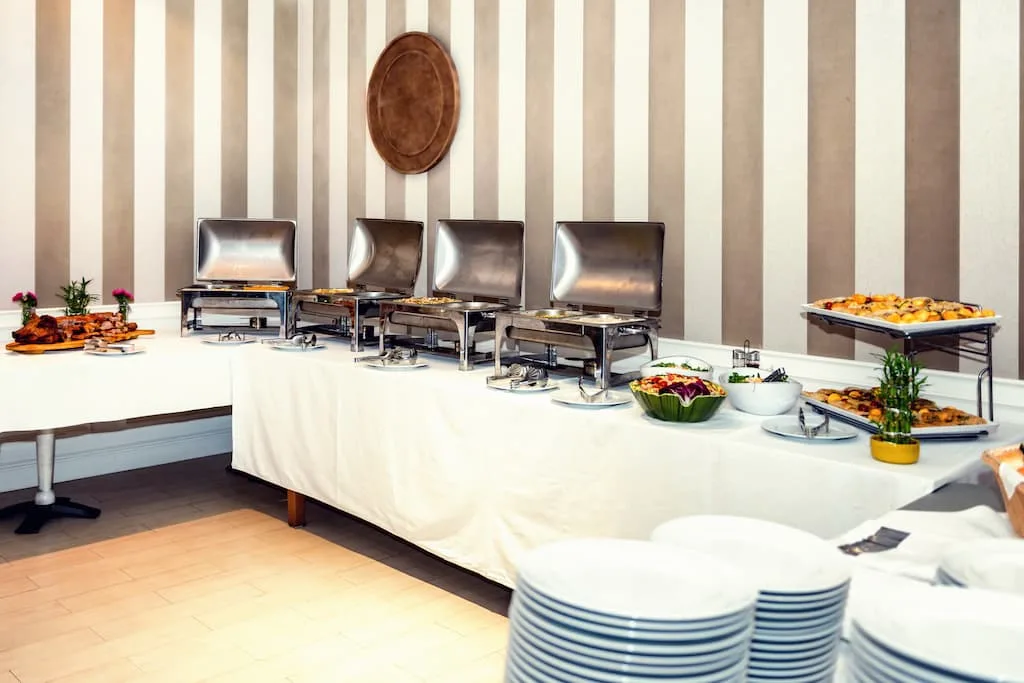
Conclusion
In the catering business, where taste and presentation weave together to create memorable experiences, the significance of catering food and drink supplies cannot be overstated. Whether you’re embarking on a new catering venture or seeking to enhance an existing one, understanding the harmony of food and drink provisioning is paramount. You need to create a distinct niche setting you apart from the competitors and take your place at the top by providing quality service and dishes. Sourcing from reliable suppliers and preparing quality dishes using quality supplies, and having suitable catering equipment will take your operation one step ahead.
From sourcing quality ingredients to perfecting drink concoctions, we gave simple but effective tips for culinary success. With a meticulous grasp of food safety, the art of presentation, collaboration with reliable suppliers, and diverse catering equipment, you can craft exceptional events that leave a lasting impression. Your catering venture is primed for triumph in every delectable bite and sip.

